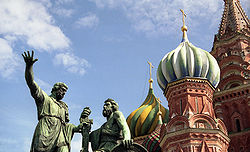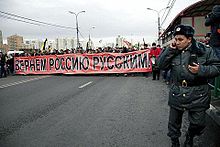- Unity Day (Russia)
-
Unity Day, Day of People’s Unity or National Unity Day (Russian: День народного единства) was celebrated in the Russian Empire until 1917 and in Russia from 2005. Held on November 4 (October 22, Old Style), it commemorates the popular uprising which expelled the Polish-Lithuanian occupation force from Moscow in November 1612, and more generally the end of the Time of Troubles and foreign intervention in Russia in the Polish-Muscovite War (1605–1618). Its name alludes to the idea that all the classes of Russian society willingly united to preserve Russian statehood when its demise seemed inevitable even though there was neither Tsar nor Patriarch to guide them. In 1613 tsar Mikhail Romanov instituted a holiday named Day of Moscow’s Liberation from Polish Invaders.[1] The holiday, held in October, was abandoned in 1917. November 4 is also the feast day for Our Lady of Kazan, the holy icon which the Russian Orthodox Church probably venerates most.
Contents
Popularity
According to a recent poll (2007), only 23 percent of Russians know the name of the holiday, up from 8 percent in 2005. 22 percent identified the holiday as the Day of Accord and Reconciliation, the name of the Nov. 7 holiday in the 1990s. Only 4 percent knew that the holiday commemorates the liberation of Moscow from Polish invaders, down from 5 percent in 2005.[2]
Controversy
President Vladimir Putin reestablished the holiday in order to replace the commemoration of the October Revolution, known as The Day of Great October Socialist Revolution during Soviet period and as The Day of Accord and Conciliation in post-Soviet times[3], which formally took place on November 7. His decision angered some sections of the public[4], particularly the Communist Party, who pressed on with celebrations on Nov. 7. Putin's predecessor, Boris Yeltsin took a limited action of changing the name of the holiday; by completely removing it, Putin has sparked a controversy that continues today.
There have been concerns about the manifestations of ultranationalism during the celebrations of the National Unity Day. In November 2005 and 2006, rallies were held in Moscow at which demonstrators shouted "Russia for Russians!", made neo-Nazi salutes, and held placards with swastikas, anti-semitic and anti-immigration slogans. While President Putin and the former mayor of Moscow, Yuri Luzhkov, have condemned such slogans and sentiments, xenophobic rhetoric is increasingly being adopted and manipulated by some politicians and officials.
See also
- Public holidays in Russia
- 1612, a historical fantasy movie
- Unity Day in other countries
References
- ^ "Russia Newsroom article". http://www.russiannewsroom.com/content.aspx?id=5895_Politics&date=2007-11-4.
- ^ "The Moscow Times". http://www.themoscowtimes.com/stories/2007/11/02/014.html.
- ^ "Trinity College Page". http://www.trincoll.edu/depts/mdlg/Russian/pages/Events.html.
- ^ For example, see Акция против дня «Народного единства»
 Public holidays in RussiaNew Year's Day/New Year · Defender of the Fatherland Day · International Women's Day · International Workers' Day · Victory Day · Russia Day · Unity DayCategories:
Public holidays in RussiaNew Year's Day/New Year · Defender of the Fatherland Day · International Women's Day · International Workers' Day · Victory Day · Russia Day · Unity DayCategories:- Russian society
- Russian culture
- November observances
- Unity days
Wikimedia Foundation. 2010.


